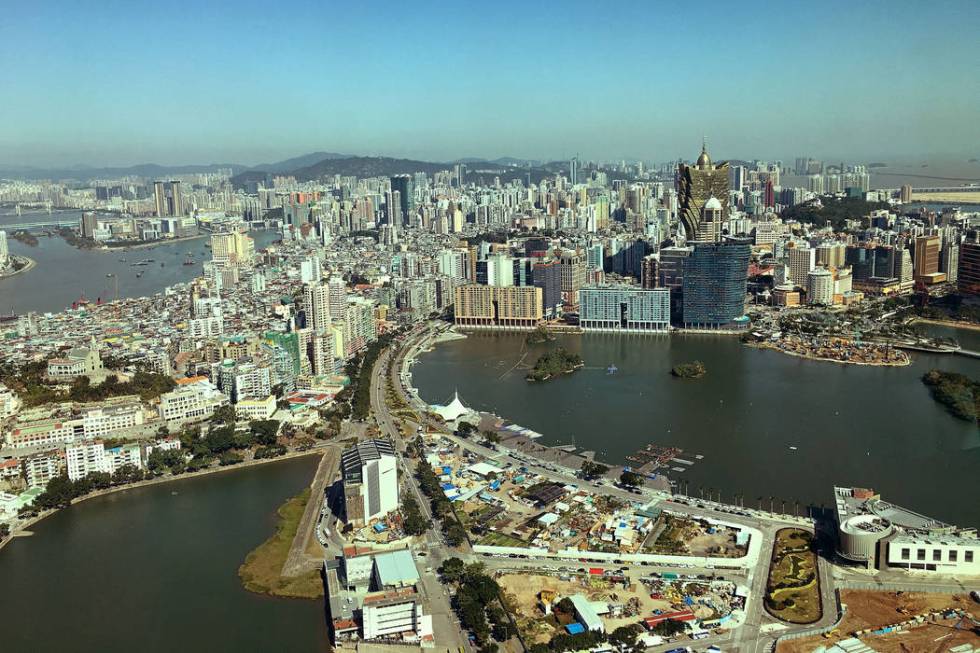VIP business down in Macao for Las Vegas-based casino companies

VIP business in Macao has taken a hit from the U.S.-China trade war, adversely affecting three Las Vegas-based companies.
The trade war, along with protests in Hong Kong, are starting to affect the Macao properties owned by Las Vegas Sands Corp., MGM Resorts International and Wynn Resorts Ltd.
The three companies own nine casinos in Macao, an autonomous region on the south coast of China. Wynn and Sands are especially reliant on the region, with about 70 percent and 64 percent of their revenue based there, respectively. About 22 percent of MGM’s revenue comes from Macao.
“We did have weaker-than-normal VIP hold in the quarter,” said Jim Murren, CEO of MGM, during a call to investors last month. As a result, the company lost about $10 million from cash flow.
Wynn and Sands also have reported declines in the VIP market in recent months.
Macao casinos are extremely reliant on VIP high rollers; revenue from VIP baccarat made up 47.2 percent of all casino gaming revenue last quarter, according to the Gaming Inspection and Coordination Bureau of Macao.
While Macao casinos’ VIP markets are hurting, analysts expect the market to rebound. “I don’t consider the trade war to be a long-term issue,” said Jefferies analyst David Katz.
‘Customers are concerned’
After months of tension between the U.S. and China, the trade war has continued to escalate; after President Donald Trump sent a tweet this month that threatened tariffs on about $300 billion of Chinese goods, China let its currency drop and U.S. stocks plunged to their worst losses of the year.
Last month, gross gaming revenue in Macao fell 3.5 percent from the previous year to $3 billion, with VIP baccarat revenue down 15.6 percent, according to Macao’s Gaming Inspection and Coordination Bureau. The region is the world’s highest-grossing gambling jurisdiction, and took in $37.6 billion in gaming revenue last year compared to $11.9 billion in Nevada.
Wynn CEO Matt Maddox said during a call to investors this month that the company is “continuing to see some choppiness in the premium market and in the VIP market,” with cash flow in April down 21 percent compared to the year before.
Last month, Sands President and Chief Operating Officer Robert Goldstein told investors that the company’s high-roller customers are affected by the trade war. The company reported a 12 percent decline in VIP volume.
“Customers are concerned in the trade war,” Goldstein said. “It’s not a good thing from their perspective.”
As operators wait for VIP revenue to pick up again, they’re turning their focus on mass segments, according to Katz.
A July report from Jefferies said average daily revenue was up 5 percent month-over-month for mass markets, compared to a 5 to 6 percent decline for the VIP segment.
Long-term optimism
Analysts are unsure when the trade war will end, but they’re confident the VIP dip is merely a blip on the radar.
“We do not think the trade war will dictate long-term strategies,” said Union Gaming analyst John DeCree.
Once the trade war is resolved, DeCree expects a gradual recovery for the Macao market over several months. Until then, he said, Macao and greater China are still “compelling places” to invest.
“We expect operators will continue to manage their business and invest for the long-term potential,” DeCree said.
As companies continue to wait for trade tensions to pass, near-term share prices could continue to fluctuate, according to a Stifel report from analysts Steven Wieczynski and Brad Boyer.
“The headwinds facing these segments are not likely to dissipate anytime soon,” according to the report.
The Review-Journal is owned by the family of Las Vegas Sands Corp. Chairman and CEO Sheldon Adelson.
Contact Bailey Schulz at bschulz@reviewjournal.com or 702-383-0233. Follow @bailey_schulz on Twitter.